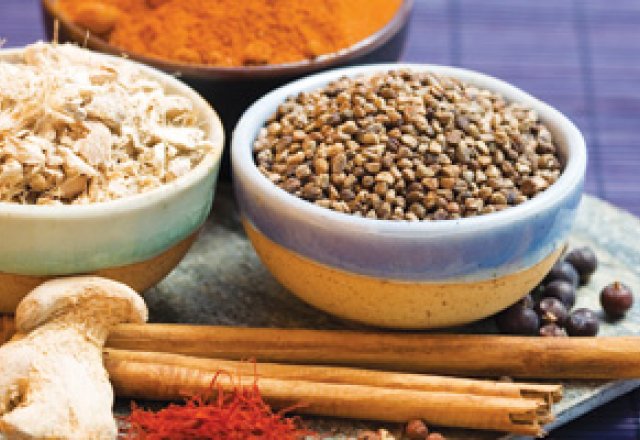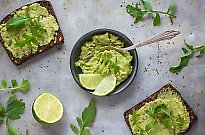
10 weight loss wonders

Herbs and spices to slim you down
Herbs and spices have been the prescription for all kinds of ailments throughout history
Only in the last few years however, has Western science confirmed what some herbalists and Eastern medicine doctors have known for centuries, that in fact, some of these gifts from nature can help maintain your ideal weight.
1. Turmeric
Ever felt a little stressed or perhaps PMS took its hold, and all you could think about was a tray of Tim Tams or bag of chips? These cravings are not uncommon and are often due to hormonal imbalances. The body can try to combat the effects of an increased production of stress hormone cortisol, or a drop in production of feelgood brain chemical serotonin, before menstruation, by causing you to crave sugar or refined carbohydrates.
Tumeric, which is the powdered rhizome (underground stem) of a tropical southern Asian plant, is known to be a natural detoxifier, blood purifier, but is also able to regulate hormones, stimulate liver function, and therefore assist in preventing these potentially fattening hormone-induced cravings. Try it in your next egg, curry or rice dish.
2. Cayenne pepper
This native of the Americas has become a popular addition to hot sauces and spicy dishes, and also to many diet supplements, as it boosts metabolism and may also deter overeating.
“Studies have shown that it decreased levels of hunger hormone ghrelin,” says Melbourne dietitian Amy Hooper. The pepper’s active ingredient capsaicin, which other members of the chilli family also possess but not usually in such high amounts, also aids in overall vitality by increasing bloodflow, which helps deliver vital nutrients efficiently around the body.
3. Guarana
Guarana is another ingredient commonly found in weight loss supplements as it contains caffeine, which increases metabolism, dissuades cells from storing dietary fat, is used as an appetite suppressant and can enhance endurance during exercise, promoting increased energy burning.
Guarana contains the highest levels of naturally-occurring caffeine (more than twice than coffee beans). It is commonly found as an additive to energy drinks and chocolate bars, but can also be taken in teas or supplement form.
However, just with all caffeine-laden foods, caution must be exercised when consuming guarana, particularly by people with high blood pressure, heart disease, or those who are pregnant or lactating. Generally, 500mg of caffeine per day is considered a safe dose.
4. Dandelion
There is no doubt that when we feel sluggish, we are more inclined to curl up on the couch with takeaway or other types of fattening comfort foods, rather than exercising or preparing a healthy meal. One of the reasons we might feel tired and lacking vitality is due to a build-up of toxins in the body. We can combat this through a healthy diet. Dandelion is able to help by stimulating liver function, while also flushing wastes from the kidneys through its mild laxative effect. Consume this Eurasian flowering plant through tea or in capsules.
5. Chamomile
Constipation can also make us feel sluggish and tired. Unfortunately, when we feel this way, we often reach for unhealthy foods laden in fats and sugars to give us a quick boost in energy, which of course leads to weight gain. Eating plenty of fibre will help, as will sipping on some chamomile tea. This European and west Asian flower has a calming effect on the digestive system, encouraging regular bowel movements.
6. Green tea
The camellia sinensis plant, found in your kitchen cupboard as green tea, has been consumed in its native China and the surrounding region for thousands of years. Researchers have only recently discovered its high antioxidant levels could possibility assist in the prevention or treatment of a range of illnesses including heart disease, Alzheimer’s and some forms of cancer. These same compounds have also been recognised as metabolism boosters.
“They increase fat oxidation and thus may have a small positive effect on weight loss and weight maintenance,” Amy says.
7. Gymnema
The Indian plant gymnema has a interesting effect on the body when consumed with sugar that may assist dieters and diabetics alike. Taken as a tea or in supplement form, gymnema has been shown to be able to reduce blood sugar levels if taken over a period of time, being able to inhibit not only the taste, but the absorption of sugar in the body. While researchers agree more studies need to be put in to research its full effects, this herb could act as a dieter’s dream, by potentially reducing sweets cravings and calorie intake. Interestingly, Gymnema’s Hindi name Gurmar means ‘sugar taste destroyer’.
8. Cinnamon
If you must give into your sweet tooth, try reducing your energy intake by adding a sweet, but low calorie spice like cinnamon to your treat rather than sugar. Hot drinks, cereals or muffins work particularly well. But the benefits of cinnamon don’t end here. This dried bark of a native Sri Lankan tree is rich in antioxidants, aids in digestion, and a 2003 study in Diabetes Care also found that taking 1-6g of the spice per day could not only lower cholesterol, but could also reduce blood sugar levels.
9. Ginseng
Feeling that afternoon slump in energy come on again? Instead of reaching for a latte or high carbohydrate sugary treat, try a cup of ginseng tea to raise your energy levels. Made from a dried root of a plant native to China and Korea, ginseng has been used for centuries as a treatment for fatigue, to aid recovery after illness, as an aphrodisiac and as a relief to stress.
Science has proven that ginseng can indeed improve circulation, raise energy levels, regulate blood pressure and assist the body over come stress and fatigue. It can be bought as a tea, tincture, or in supplement form.
10. Ginger
Native to tropical forests of Southeast Asia, ginger is a rhizome credited to being able to aid in digestion and treat nausea, and thus contribute to overall vitality. But another way ginger is able to aid in healthy weight maintenance is as a tasty substitute for fattening additives in our cooking.
Browse more super foods or connect with us on Facebook.


